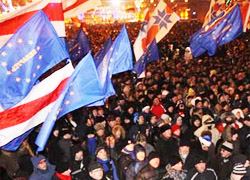Andrei Sannikov: People's uprisings cannot be forgotten
32- 3.01.2014, 15:35
- 56,893

The political collapse of the regime is a fact, the leader of the civil campaign European Belarus is confident.
Andrei Sannikov, a former deputy foreign minister of Belarus and leader of the civil campaign European Belarus who spent 18 months in prison, gives his opinion on the reasons for tightening repressions three years ago and compares the situations in Belarus and Ukraine. An interview with the politician was published in Dziennik Gazeta Prawna (Poland) on January 2.
– Three years ago, after the elections of December 19, 2010, independent Belarus saw large-scale repressions. Nobody expected such a reaction from the authorities, especially after a certain liberalisation of the regime. Why was the rally dispersed?
– The authorities felt fear. I cannot agree with the statement about liberalisation. There was nothing like that at least for a simple reason: the death of Aleh Biabenin [one of leaders of Sannikov's team]. It's hard to believe it was a suicide. Nevertheless, we managed to extend the boundaries of freedom. At the beginning people were afraid, but later every signature collecting station turned into a small rally. Lukashenka didn't expect people to be so active. When he saw Minsk's central street full of people in the evening after the elections, he got scared even more. So, he ordered to disperse the rally.
– The dispersal couldn't have been avoided, could it?
– I tried to convince European diplomats that their presence at the rally was necessary at such moments. They didn't do it in 2010 in Belarus, but they do it now in Ukraine. It works. It helps people feel solidarity. Nobody expected the crackdown on the first day of protests. Lukashenka hadn't done it before. More people would have come on the second day, as it was during the current Ukrainian protests. The country was in crisis, it was confirmed by the ruble devaluation three months later.
– The scale of the crackdown on opposition members after December 19 distracted many people from political activities. Many were arrested or had to emigrate. The opposition's potential decreased significantly.
– I cannot agree. The political collapse of the regime on December 19 is a fact. After my release from prison, I couldn't walk calmly in streets – many people came to me to shake hands and thank me. Before these events, we were treated like actors: they applaud if you succeed, but boo if you fail. Our imprisonment helped to spread solidarity. There's apathy, but we also have an experience of the people's uprising. Uprisings are never forgotten.
– Perhaps, it helped to spread solidarity, but it didn't help to cope with fear.
– On the contrary, people were not afraid of writing letters to prisons. I was surprised to see how many people signed letters with their real names, though they knew the KGB checked the letters. Changes must come. But the question when they will come is both to us and Europe.
– Europe replied to repressions with sanctions.
– Sanctions should be more quick and decisive. Lukashenka didn't keep his word to Europe. He deceived it again. He proved he cannot be its partner.
– Were the sanctions successful?
– My release from prison is the result of sanctions. They stopped expanding them, and concessions stopped. Mikalai Statkevich [the former presidential candidate] is in prison, Ales Bialiatski [the leader of Viasna human rights centre] is in prison. They should have continued to impose sanctions.
– If the EU had extended sanctions after your release, Lukashenka could have understood it in his own way and refused to make more concessions.
– It's not his logic. The only language he understands is force. If sanctions had been strengthened, Statkevich could have been freed.
– How do the authorities react to the events in Ukraine? It's the first time for many years when Lukashenka has spoken about closer relations with the EU. Is he returning to the policy of manoeuvering?
– It's not so. You turned attention to Lukashenka's words, but I noticed the dispersal of a picket to defend Maksim Bahdanovich Literary Museum in Minsk. These actions reflect the true nature of the authorities, not Lukashenka's deceitful words who only wants money from the EU.
– Which scenario do you find more real: overthrowing the authorities through protests or a palace coup?
– The change of power is impossible without protests. Look what is happening: the Belarusian post-election protests in 2010, protests in Russia against the fraudulent elections, protests in Ukraine. The so called Slavic triangle is at the breaking point. An explosion may happen. We are in a more difficult situation. Ukraine has opposition in the parliament and independent media, the things we don't have.
– How many opposition candidates should run in the 2015 elections: one or several?
– It's too early to make such statements. Perhaps we will have to boycott the elections. But it's more difficult to control many candidates. The single candidate supposes the full control by the KGB.
– Did the KGB control Aliaksandr Milinkevich in 2006?
– I cannot say for sure that he was an agent, but it's obvious for me that the KGB knew all his plans. It's easier to watch one person than nine candidates as in 2010.
Interviewed by Michal Potocki, Dziennik Gazeta Prawna









